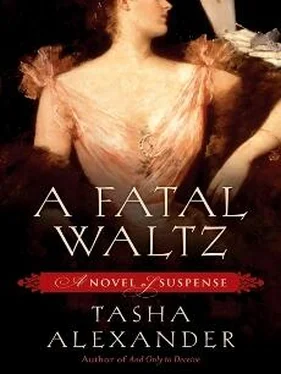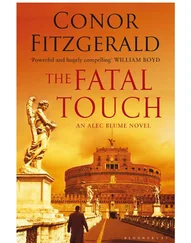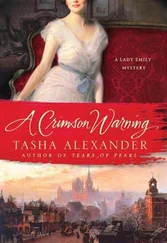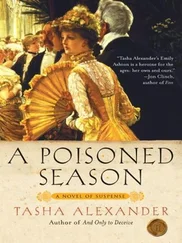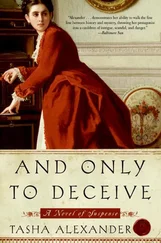At one o’clock, I rose from my bed and paced. At two forty-five, I lit a lamp and tried (and failed) to finish reading The Picture of Dorian Gray . At three thirty, I gave up and scrawled a note to Colin. If he was back in Vienna, he’d have found the letter I’d left detailing Schröder’s plans. The message I wrote now was a simple declaration of love. Before five o’clock, I’d lost the sense of human decency that had kept me from waking my butler. I marched through hallways and upstairs to the servants’ quarters, where I rapped on Davis’s door.
“Madam?”
“You’re already dressed,” I said, surprised.
“It’s nearly five o’clock.”
“Heavens. I’d no idea you get up so early.”
“The household, madam, does not run itself.”
“Well, I shall have to send you to bed earlier. I can’t have you running yourself into the ground.” I passed him the paper I’d brought with me. “Would you please have this wired at once to Mr. Hargreaves in Vienna?”
“It will be my pleasure.” He bowed neatly.
“And, Davis?”
“Madam?”
“You may take the afternoon off. I’m sure that Odette would appreciate seeing some of London before she and Madame du Lac return to Paris.”
“Madam, let me assure you that I am not—”
I raised a hand. “That’s a direct order, Davis. Don’t disappoint me.”
I returned to my bedroom, but there was little point in trying to sleep now. I rang for Meg, soaked in a hot bath for an obscene length of time, and dressed for the morning. None of my friends was yet awake, and I didn’t want to disturb them, so I breakfasted alone, kept company only by the worry I felt for Colin.
Alone, that is, until my mother stormed through the door.
“Lady Bromley, madam,” Davis called over her shoulder, not bothering to come into the room.
“Mother, I thought you were in Kent,” I said, suddenly feeling even more exhausted than I had before.
“I came the moment I heard you were back in England. You did go to Newgate. I’ve had it confirmed by an unimpeachable source, so don’t bother trying to deny it. Whatever could you have been thinking?”
“Robert asked to see me.” I was too tired to come up with an excuse that might be more palatable to her.
“How dare he try to compromise you with such a request? Where is Ivy? I want to speak to her.”
“She’s still asleep, Mother, and I’ll not have you bothering her. She’s upset enough.”
“Well, she ought to be. Made a very poor choice of a husband, if you ask me—”
“I didn’t.”
“Emily!” She rapped her umbrella on the floor. “I will not have you speak to me in such a manner. It’s unconscionable that you—”
“Ivy has trouble enough to contend with. She doesn’t need you to add more.”
“Her situation is—”
“More dreadful than you think.” I measured my words carefully, looked at my mother and raised an eyebrow.
“Really?” She spoke slowly; I nodded. “Poor, dear girl! What will become of the child? This is too awful!”
“Robert is not guilty, Mother. He will be exonerated.”
“I wouldn’t say that with such confidence if I were you,” she said. I could see her mind working, going through the ranks of unmarried men. “There must be a respectable widower out there who would be willing to take her on. An older gentleman, perhaps. By the time she’s out of mourning she will be somewhat less tainted by the scandal, but—”
“Mother! Robert is not dead.”
She sighed. “Of course not. But it never hurts to plan ahead.”
“Now that you’ve mentioned scandals, though, I’ve a question for you.” This piqued her interest, but she waited until a maid had poured coffee for her and left the room before asking me to elaborate. “Do you remember Albert Sanburne?” I asked.
“Sanburne…” She looked towards the ceiling for approximately fifteen seconds before bringing her attention back to me. “Oh, yes. Sanburne. Such a tragedy that he died so young. And his poor sister! How we all despaired for her. She was left without even enough money for a dowry. None of her relatives wanted to take care of the girl—as I recall, she moved from house to house every six months or so. To lose a brother so soon after the deaths of both her dear parents. Too awful for words.”
“To put it mildly,” I said.
“I must say, Emily, that I did fear for your health while you were in Vienna. The influenza is worse there than anywhere. I’m convinced Sanburne would never have died had he contracted the disease somewhere else.”
“Why had he gone to Vienna?” I asked. “I understand there was some to-do over his engagement.”
“Oh, yes. I believe the girl’s father went all the way to Vienna to break the betrothal.”
“That’s strange, isn’t it?”
“Fathers are protective of daughters. It was said that his objections to Mr. Sanburne were very strong indeed.”
“What were they?”
“I don’t know. It was never discussed.”
“Who was the girl?”
“Helen Macinnis. She was heartbroken at the time, but wound up marrying a captain in the Horse Guards. It was an excellent match.” She poured a second cup of coffee. “To return to the reason for my visit, I cannot allow—”
“Did you know, Mother, that Mr. Sanburne did not actually die of influenza?”
“What can you possibly mean by that? Of course he did. It was in all the newspapers.”
“He committed suicide in Vienna. It was in all the papers there.”
“Is that so?”
“I’m absolutely certain. Have even confirmed it with Sir Julian Knowles.” As I spoke, I saw in her eyes an admiration that had never before been directed to me. But then I’d never before given her such stunning gossip.
“Did I tell you that your father and I have been invited to Sandringham for Prince Eddy’s birthday dinner next week?” she asked. “Perhaps I could ask the queen if the invitation might be extended to include you.”
“I wouldn’t want to impose. Particularly when she’s been so gracious about the wedding.”
“Oh, I suppose you’re right. Now, have your servants prepare a room for me. I may as well spend a few days with you before I return to the country.”
2 January 1892
Vienna
Dear Kallista,
How sorry I was to call at the Imperial today and find you had left Austria without so much as a good-bye! So I must write to commend you and Cécile on your brilliance. Word about my drawing of the empress leaked out almost the moment she left the Hotel Imperial. It was reported yesterday in the newspaper that she was so pleased with the image that she gave it to the emperor, just as she’d told us she planned to do.
Since then, I have been flooded with portrait commissions—funnily enough, no one wants me to paint them—only to do a charcoal as I did for the empress. Sketches are now all the rage in Vienna.
Best of all, however, is that the dreaded Frau Eckoldt is thawing towards me. She wants a drawing of her own, and I have agreed to do hers before anyone else’s. She told me that if she likes my work, she will invite me to tea at her house. I am certain that it is only a matter of time before my darling Anna and I are engaged. I owe you multitudinous thanks, especially because the assistance you provided would have had no effect if the empress did not truly appreciate my skills. So I emerge from this with pride intact.
On a sadder note, I should tell you that we’ve lost a mutual friend. Gustav Schröder committed suicide on New Year’s Eve. I know you will be as sorry as I was to hear this news.
I hope this letter finds you well and am wishing you much happiness in the New Year. Please tell your friend Bainbridge that I’ve sent the sketch of you he requested to his London address.
Читать дальше
